| |
|
|
| |
Anti-smuggling
A major mission of the department is to prevent and detect the
smuggling of contraband and prohibited articles, the import and
export of which are controlled under the laws of Hong Kong, for
the purpose of protecting the community and environment, maintaining
public health and fulfilling international obligations. Items
being smuggled include dutiable commodities, narcotics, firearms,
strategic goods, infringing copies, goods bearing forged trademarks
and goods with false origin labels. In the fight against smuggling
activities, the department has strived to maintain a proper balance
between control and trade facilitation to ensure speedy flow of
legitimate cargoes at the entry and exit points.
In the past two years, the department continued to make achievements
in anti-smuggling work without compromising the objectives of trade
facilitation. Details of the anti-smuggling achievements are provided
in the ensuing paragraphs.
|
|
| |
|
|
| |
|
|
| |
Smuggling
between HKSAR and the Mainland
Smuggling of general merchandise between Hong Kong and the Mainland
is a matter of concern for both sides. In 2005, the department
detected 288 smuggling cases, including 133 at sea and 155 on land
resulting in the arrest of 338 persons and the seizures amounted
to $271.6 million. In 2006, 204 smuggling cases were detected,
110 at sea and 94 on land, with 393 arrestees and $266.8 million
worth seizure.
The drop in the number of cases and the seizure value, as compared
the figures between 2005 and 2006, indicated that the sustained
stringent enforcement by the department coupled with the closer
cooperation with the Mainland counterparts and local enforcement
agencies have successfully deterred the smuggling activities in
2006.
The duty gradient between Hong Kong and the Mainland is the major
reason that spurs smuggling activities. Electrical appliances,
computers and related accessories, mobile phones, vehicles and
vehicle parts, marked oil and optical discs are hot items which
smugglers favour sneaking into the huge market on the Mainland
side. On the other hand, cigarettes, illicit fuel, pirated optical
discs, counterfeit goods and chilled or frozen meat are popular
items in the black market in Hong Kong. The very busy boundary
crossing points and ports provide an opportune environment that
has been taken advantage of by smugglers.
The common concealment methods used on land were false compartments
built at lorries and containers. Declared goods were placed at
the outermost part of the cargo compartment as camouflage. At sea,
speedboats, motorized sampans and fishing vessels were the common
means of conveyance used by smugglers and their smuggling activities
usually took place at night so as to evade enforcement detection. However,
they could not escape from Customs detection which was attributable
to expertise, advanced detection equipment and accurate intelligence
analysis.
|
|
| |
|
|
| |
|
|
| |
Dutiable
Commodities
In 2005, interdiction of cigarette smuggling remained a task of
priority to the department. During the period, a total of 100.7
million sticks of cigarettes was seized. While cigarette smuggling
by cross-boundary vehicles from the Mainland continued to prevail,
some criminal syndicates were seen using speedboats and sampans
to smuggle illicit cigarettes into Hong Kong waters and transfer
them onto connecting lorries for distribution to the local black
market. However, in 2006, the use of this sea-borne smuggling mode
diminished substantially in the wake of the department’s
vigorous enforcement. The use of cross boundary vehicles to smuggle
cigarettes into Hong Kong continues. By the end 2006, a total of
78.7 million sticks of cigarette was seized.
Smuggling by Cross-boundary Vehicles
Mix-loading with false declaration was
a common cigarette smuggling tactic by cross-boundary lorries.
On 7 March 2005, officers of Lok Ma Chau Control Point detected
a smuggling case with the largest quantity of cigarettes seized
in the year 2005. From an incoming lorry, which was falsely declared
to carry “Plastic Hand-made Flower”, Customs officers
seized 3.2 million sticks of cigarette valued at $4.74 million
with duty potential amounting to $2.54 million.
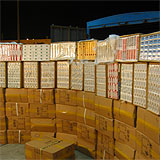 |
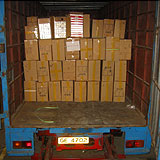 |
| 3.2
million sticks of assorted illicit cigarettes
were seized inside the cargo compartment of a
lorry at Lok Ma Chau Control Point. |
Seizure
of 3.2 million sticks of assorted illicit cigarettes. |
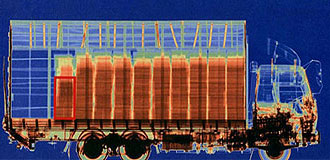 |
| X-ray
scanning image of the lorry. |
|
|
On 1 September 2005, officers of Man Kam To Control Point detected
a cigarette smuggling case in which a total of 1.18 million sticks
of cigarette, with a market value at $1.77 million and duty potential
at $0.95 million, were seized from an incoming lorry. The smuggler
deceitfully mixed the cigarettes with other items, including fresh
fruits and undeclared fresh pork, inside the cargo compartment
of the vehicle.
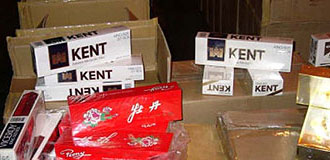 |
| Seizure
of illicit cigarettes from an incoming lorry
at Man Kam To Control Point. |
|
|
On 17 November 2005, officers of Man Kam To Control Point seized
2.15 million sticks of illicit cigarette on board an incoming truck.
The cigarettes were stashed under the general cargo of “electronic
accessories” and “woman clothing” as cover load
to distract Customs inspection. The total seizure value was $3.53
million and the duty potential amounted to $1.73 million.
On 5 March 2006, officers of Lok Ma Chau Control Point detected
another smuggling case from an incoming lorry, which was falsely
declared to carry “Clothing and Returned Material”.
A total of 2.7 million sticks of cigarette, valued at approximately
$4.07 million with duty potential amounting to $2.18 million, were
seized.
 |
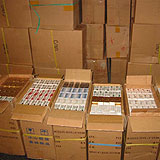 |
| 2.7
million sticks of assorted illicit cigarettes
were seized from an incoming lorry at Lok Ma
Chau Control Point. |
2.7
million sticks of assorted illicit cigarettes. |
|
|
In 2006, criminal syndicates’ smuggling tactics became more
sophisticated as Customs enforcement intensified. On 20 September
2006, officers of the Anti-Illicit Cigarette Investigation Division
raided a fenced area at Fanling and seized therein 821 020 sticks
of illicit cigarettes. These cigarettes had been packed in specially
tailored cardboard boxes, concealed in 224 hollowed cement slabs
and disguised as building materials for smuggling into Hong Kong
by cross-boundary lorry. The total seizure value was $1.23 million
and the duty potential amounted to $660 100.
Smuggling by Travellers
On 7 November 2005, officers of HK-Macau
Ferry Terminal intercepted an incoming Hong Kong male passenger
for baggage examination after he had passed through the Green
Channel. As a result, 5 060 sticks of assorted cigarette with
market value of $7 590 and duty potential of $4 068 were found
inside the passenger’s traveling case and plastic bag.
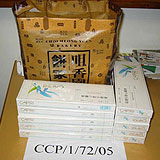 |
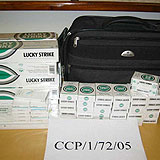 |
Smuggled
cigarettes inside plastic bag. |
Smuggled
cigarettes inside traveling case. |
|
|
On 30 November 2005, officers of HK-Macau Ferry Terminal intercepted
an incoming Filipina female passenger for baggage examination after
she had passed through the Green Channel. 8 220 sticks of assorted
cigarette, which were wrapped by carbon papers and covered by a
plastic bag, were found inside the passenger’s suitcase.
The market value of the seizures amounted to $12 330 and duty potential
of $6 608.
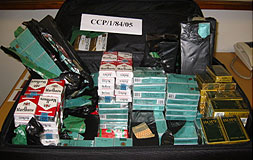 |
| Carbon
paper-wrapped cigarettes smuggled by a Filipino
female traveller. |
|
|
On 5 August 2006, officers of HK-Macau Ferry Terminal intercepted
two incoming Filipina female passengers for baggage examination
after they had passed through the Green Channel. As a result, 5
400 sticks of assorted cigarette, with market value of $8 640 and
duty potential of $4 341, were found inside two suitcases.
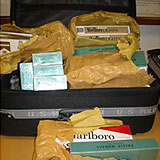 |
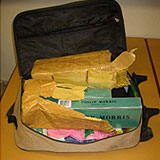 |
Smuggled
dutiable cigarettes found inside suitcases carried
by two Filipina travellers. |
|
|
To combat passengers' abuses of duty-free concessions, Customs
officers use the "Entry-Exit Processing and Records System" (EXPRESS)
of the Immigration Department system in verifying whether incoming
passengers with Hong Kong identity card have left Hong Kong for
at least 24 hours, which is a criterion for enjoying duty-free
concessions. In 2005, Customs officers at the land boundary control
points processed 41 800 cases, involving a total of 23.8 million
sticks of cigarette. Under the Compounding Scheme, fines totaling
$12.03 million were paid in respect of 3 454 abused cases
involving a total of 1.28 million sticks of cigarette in 2005.
In 2006, a total of 27 225 cases, involving a total of 15.3
million sticks of cigarette, were processed at various land boundary
control points. Under the Compounding Scheme, fines totaling $24.87
million were paid in respect of 8 065 cases involving a total
of 2.03 million sticks of cigarette.
At the Hong Kong International Airport, there were respectively
234 and 234 passengers arrested and dealt with by way of compounding
in 2005 and 2006, and 17 and 9 among them were prosecuted for bringing
into Hong Kong dutiable commodities in excess of their duty-free
concessions. The total amount so compounded was $1.44 million in
2005 and $1.43 million in 2006.
Project Crocodile
To further target cigarette smugglers who might exploit Hong Kong
as a transit point for transshipping cigarettes to other countries,
and to take sustained and vigorous enforcement actions against
illicit shipments, the department launched the “Project Crocodile” in
August 2004 with 16 other Customs Administrations in the Asia Pacific
Region. In 2005, the Project contributed to the record seizures
of 32 containers with 274.8 million sticks of illicit cigarette
worldwide, including 3 containers in Hong Kong and 26 in Europe.
Widely recognized as effective for interdiction of transnational
cigarette diversion, the Project won unanimous support from participants
at the Review Meeting in May 2005 for ongoing operation. In 2006,
in response to shipment notifications issued by the department,
the German Customs and Panama Customs seized a further 5.9 million
sticks and 4.75 million sticks of illicit cigarettes respectively.
The number of participating Customs Administrations was increased
to 18 in 2006.
The strategies of pre-emptive measure to stem the flow of illicit
cigarettes from their source, make interception at the three land-boundary
control points and strengthen intelligence collection have been
proven effective with encouraging enforcement results.
Illicit Fuel
Smuggling of illicit fuel from the Mainland by cross-boundary
vehicles and by vessels persisted in 2005. Through increased checks
on incoming vehicles and vessels, 101 cases, 77 at land boundary
control points and 24 at sea, were effected in 2005 with a total
seizure of 73 678 litres of illicit fuel. Due to our vigorous enforcement,
illicit fuel smuggling by sea was contained in 2006 and
11 cases were detected with 4 079 litres of illicit fuel seized.
As for boundary control points, 28 cases were effected with 19
133 litres of illicit fuel seized for the year.
|
|
| |
|
|
| |
|
|
| |
Dangerous
Drugs
Drug syndicates have also taken advantage of the very heavy passenger
and vehicular traffic at the various entry and exit points to smuggle
drugs into Hong Kong. Small quantity of dangerous drugs is
smuggled in at a time to reduce the chance of detection and minimize
loss upon interception.
Ketamine, cannabis, methylamphetamine (‘ice’), heroin,
cocaine and MDMA (‘ecstasy’) are the major types of
dangerous drugs smuggled into Hong Kong. In 2005, the department
detected 648 drugs cases. Among these cases, one was detected
in March 2005 at the Hong Kong International Airport with the arrest
of a Hong Kong man from Singapore who carried 16 kilograms of ketamine
contained in 32 cans camouflaged as milk powder. Follow-up
investigation led to the further arrest of 6 people and seizure
of 71.5 kilograms of ketamine with the same packing as well. In
the operation, Customs officers successfully smashed an international
drug syndicate with a total seizure of 87.5 kilograms of ketamine,
valued at $30 million, and arrest of 7 persons in Hong Kong.
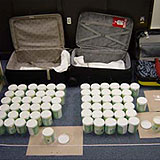 |
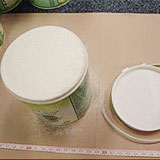 |
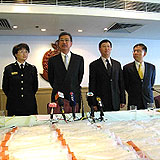 |
| 16
kilograms of ketamine packed as milk powder were
found inside an incoming passenger at the Airport
in March 2005 |
Commissioner
of Customs and Excise held a press conference
after successfully smashing a syndicate with
87.5 kilograms of ketamine in March 2005 |
|
|
In 2006, the department detected 638 dangerous drugs cases. Of
these cases, one was detected in March at the Hong Kong International
Airport with the seizure of 5 kilograms of ketamine disguised as
rice in an express air parcel arriving from India. Follow-up
investigation led to the arrest of an Indian man and a Ghanaian
man with further seizure of 6 kilograms of ketamine. The
total seizure value was $2 million. In another series of investigation,
15 cases of transnational drug trafficking by means of internal
concealment at the Airport were cracked in November 2006. Officers
seized total 30 kilograms of high-grade heroin, with street value
of about HK$14 million, and arrested 15 Africans, aged between
18 and 41.
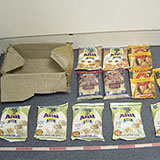 |
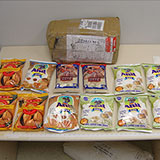 |
| 5
kilograms of ketamine in an express air parcel
arriving from India was seized at Hong Kong International
Airport in March 2006. |
The
ketamine were packed as foodstuff and declared
as "rice" |
|
|
At the Hong Kong International Airport, ketamine, heroin, cannabis,
cocaine and MDMA ("ecstasy") were the main types of dangerous
drugs seized by Customs officers in 2005, with 102 cases detected
and 77 persons arrested in total. The total seizure value
was $ 59.7 million. Major seizures included 161.1 kilograms of
ketamine, 9.9 kilograms of heroin, 13.5 kilograms of cannabis,
1.4 kilograms of cocaine and 2 249 tablets of MDMA ("ecstasy"). In
2006 , the main types of dangerous drugs seized by officers at
the Hong Kong International Airport were heroin, ketamine, cannabis,
cocaine and methylamphetamines. There were 117 cases detected with
the arrest of 68 persons. The total seizure value was $46
million. Major seizures included 73.5 kilograms of herbal cannabis,
49.2 kilograms of ketamine, 41.1 kilograms of heroin, 8.2 kilograms
of cocaine and 1.9 kilograms of cannabis buds Among these
cases, 19 involved internal concealment.
Besides, at other land boundary control points, 117 dangerous
drugs cases were detected by Customs officers in 2005, while 122
dangerous drugs cases were detected in 2006. Noticeably, the drug
couriers changed the modus operandi to smuggle smaller quantity
of dangerous drugs in each trip and make more frequent attempts
in order to minimize the loss upon interception by Customs. The
common modus operandi includes camouflaging as itinerary travelers
with the dangerous drugs mix-loaded with personal belongings.
Apart from ketamine, cocaine, heroin and MDMA, the majority of
the dangerous drugs cases detected at the control points fall in
the category of benzodiazepines such as estazolam, midazolam and
triazolam.
On 7 February 2005, officers of Lo Wu Control Point successfully
detected a dangerous drug case from a Mainland male traveller camouflaging
as normal incoming traveller among the crowds. A total of 200 grams
of heroin hydrochloride in two packets, valued at $70 000, were
found inside the inner pocket of the jacket wearing by the male.
On 7 April 2005, around 5.4 kilograms of cannabis resin, with
an estimated market value of $474 800, were seized from a Napalese
male arriving from Bangkok. A slab of drugs was found concealed
inside the bottom layer of the defendant’s check-in suitcase.
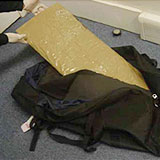 |
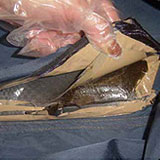 |
Officers
at the Airport seized 5.4 kilograms of cannabis
resin from an incoming passenger |
|
|
On 11 May 2005, officers of Lok Ma Chau Control Point searched
an outgoing 40-foot container truck which was declared as “empty”.
50 kilograms of ketamine, valued at $12.2 million, were eventually
found inside the driving compartment.
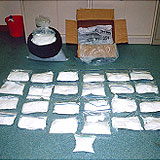 |
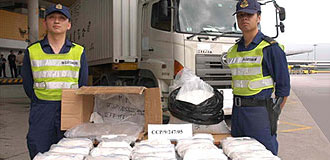 |
| 50
kilograms of ketamine were packed in zip-lock
plastic bags and nylon bag and placed inside
the driving compartment of an outgoing tractor
at Lok Ma Chau Control Point in May 2005 |
50
kilograms of ketamine seized inside the driving
compartment of an outgoing 40-foot container
truck at Lok Ma Chau Control Point. |
|
|
On 29 May 2005, 2.6 kilograms of herbal cannabis, with an estimated
market value of $169 000, were seized from an inbound express parcel
arriving from Ghana. Upon examination of the parcel declared as “Tile
sample”, five packets of herbal cannabis were found.
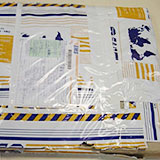 |
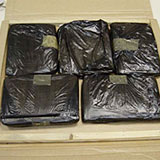 |
2.6
kilograms of herbal cannabis were seized from
an inbound express parcel falsely declared as “Tile
sample” |
|
|
On 3 August 2005, 2.2 kilograms of heroin with an estimated market
value of $849 200, were seized from a Filipino female arriving
from Bangkok. The drugs were concealed inside the bottom layer
of the defendant’s suitcase.
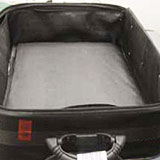 |
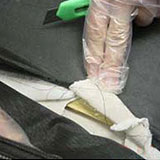 |
2.2
kilograms of heroin concealed inside the bottom
layer of luggage were seized by officers of the
Airport Command in August 2005 |
|
|
In September 2005, officers at Lok Ma Chau Control Point intercepted
an incoming private car and arrested a local male passengers who
was found in possession of 25 900 tablets of midazolam, valued
at $492 000.
On 29 October 2005, officers at Man Kam To Control Point successfully
detected a significant dangerous drugs case from a local male drug
courier camouflaging as normal daily tripper among the crowds.
One kilogram of cocaine, valued at $489 000, was found in a plastic
bag contained in a shoulder bag carried by the drug courier. Drugs
smugglers also took vehicular channel for trafficking.
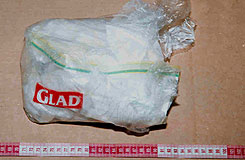 |
| 1
kilogram cocaine was carried by a local passenger
inside a shoulder bag through Man Kam To Control
Point in October 2005. |
|
|
On 3 December 2005, around 12.5 kilograms of ketamine, with an
estimated market value of $3 33 million, were seized from an inbound
express parcel arriving from Singapore via Subic Bay. Upon examination
of the consignment declared as “one pair of speaker”,
the drugs in 18 packets were found concealed inside the speakers.
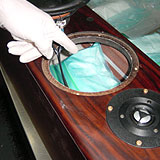 |
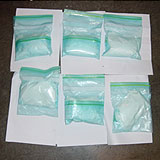 |
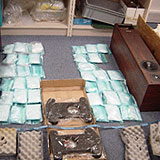 |
| 12.5
kilograms of ketamine were found inside an inbound
express parcel declared as “one pair of
speaker” in December 2005 |
‘A
pair of speakers’ containing 12.5 kilograms
of ketamine were sent into Hong Kong by express
parcel in December 2005. |
|
|
Another case with seizure valued at $2 million was detected in
April 2006 at the Hong Kong International Airport. In the case,
officers uncovered 3 kilograms of cocaine concealed inside the
inner lining of an unaccompanied rucksack arriving from Bangkok.
Follow-up investigation led to the arrest of a Filipino woman.
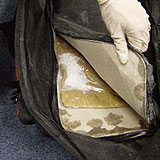 |
| 3
kilograms of cocaine were concealed inside the
inner lining of a rucksack at Hong Kong International
Airport in April 2006. |
|
|
On 11 April 2006, around 3.1 kilograms of heroin, with an estimated
market value of $1.4 million, were seized from a Taiwanese female
arriving from Phnom Penh, Cambodia. The drugs were packed as foodstuff
of “Chan Pai Mui” (陳皮梅) and placed
inside the defendant’s check-in baggage.
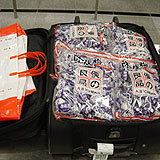 |
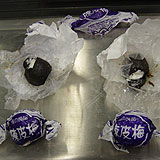 |
3.1
kilograms of heroin were seized by officers at
the Airport in April 2006. The drugs were packed
as foodstuff of “Chan Pai Mui” (陳皮梅)
and placed inside the check-in baggage of an
incoming passenger. |
|
|
On 14 June 2006, around 2.6 kilograms of heroin, with an estimated
market value of $1.29 million, were seized from a Philippines female
arriving from Bangkok, Thailand. The drugs were concealed
inside the inner linings of the defendant’s hand-held knapsack.
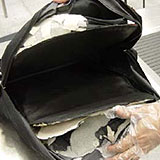 |
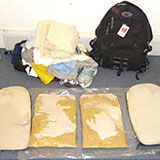 |
2.6
kilograms of heroin concealed inside the inner
linings of the
hand-held knapsack |
|
|
On the same month, Customs officers at Lok Ma Chau Control Point
successfully detected another significant dangerous drug case from
an incoming local male passenger. The passenger carried 12 aluminum-bags
containing 3.16 kilograms of ketamine inside a rucksack.
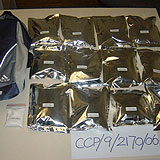 |
| 3.16
kilograms of ketamine contained inside aluminum
foil bags were found inside the backpack of an
incoming traveller at Lok Ma Chau Control Point. |
|
|
On 29 and 30 August 2006, around 45 kilograms of herbal cannabis,
with an estimated market value of $2.93 million, were seized from
two South African females arriving from Johannesburg, South Africa.
The drugs were packed in rectangular slabs and placed in the defendants’ check-in
baggage.
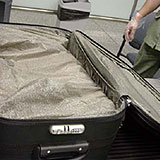 |
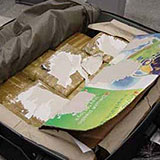 |
Officers
at the Airport seized 45 kilograms of herbal
cannabis inAugust 2006. The drugs were packed
in rectangular slabs and placed inside the check-in
baggage. |
|
|
On 14 September 2006, officers of Hunghom Railway Station successfully
detected a dangerous drug case from an incoming Mainland female
traveller. About 102 grams of methylamphetamine and 1.3 grams of
cannabis, valued at about $40 000, were found mix-loaded with personal
belongings inside her backpack.
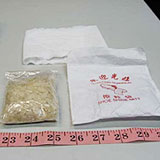 |
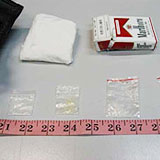 |
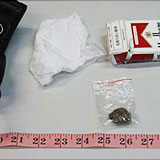 |
| 102.8
grams of methylamphetamine and 1.3 grams of cannabis
were found inside the backpack of an incoming
traveler at Hunghom Railway Station |
|
|
On 24 September 2006, shortly before the gate closed at the Lo
Wu Control Point, an incoming Mainland female traveller was intercepted
for personal search. A total of 51.5 grams of heroin hydrochloride,
valued at $27 000, was found concealed inside her vagina.
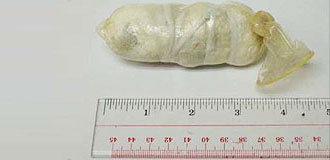 |
| 51.5
grams of heroin hydrochloride were found concealed
inside the vagina of an incoming female traveller
at Lo Wu Control Point. |
|
|
On 27 September 2006, around 2.1 kilograms of heroin, with an
estimated market value of $1.13 million, were seized from a Tanzanian
male arriving from Iran via Doha. The drugs in 142 pellets were
internally concealed inside the anus and body cavity of the defendant.
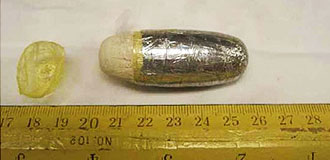 |
| 2.1
kilograms of heroin packed in 142 pellets were
internally concealed inside the anus and body
cavity of an incoming passenger |
|
|
On 2 October 2006, shortly before the gate closed at the Lo Wu
Control Point, an incoming Hong Kong male traveller was selected
for personal search. A total of 23 grams of heroin hydrochloride,
valued at $12 000, was found in his baggage.
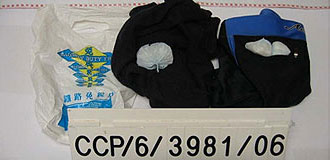 |
| 23
grams of heroin hydrochloride were found inside
the baggage of an incoming traveller at Lo Wu
Control Point. |
|
|
On 29 November 2006, around 4 kilograms of heroin and 4 750
tablets of MDMA, with an estimated market value of $2.3 million,
were seized from one HK male and two Taiwanese males arriving from
Cambodia. The drugs were concealed inside the offender’s
inner thighs and beneath the soles of their shoes.
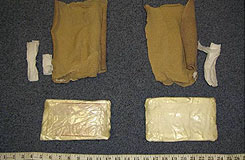 |
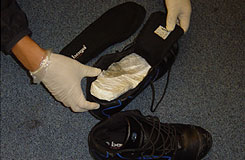 |
| 4 kilograms
of heroin and 4 750 tablets of MDMA were concealed
inside the inner thighs and beneath the soles of
the shoes of the incoming passengers. |
|
|
|
|
| |
|
|
| |
|
|
| |
Precious Metal
Since 2005, there had been a rising trend in the smuggling of
precious metal to the Mainland. In 2005, 16 cases involving 2 273
kilograms of silver were detected by Customs officers at control
points, while 11 cases involving 1 982 kilograms of silver were
detected in 2006.
On 11 July 2005, officers of the Sha Tau Kok Division searched
an outgoing 40-foot container truck. As a result, 12 pieces of
silver slabs weighing 384 kilograms and 2 000 optical disc-drive
components were seized from the vehicle. The seizures, valued at
$1.14 million, were found inside a false compartment located at
the innermost part of the container.
 |
| 12
silver slabs weighing 384 kilograms and 2 000
optical disc-drive components were concealed
inside a false compartment at the innermost part
of a container at Sha Tau Kok Control Point. |
|
|
On 3 June 2006, officers of Man Kam To Control Point selected
an outgoing 40-foot container truck for vehicle search. As a result,
17 silver slabs weighing 255 kilograms were seized from the vehicle.
The seizures, valued at $510 000, were concealed inside the frame
rail behind the driving cab of the tractor.
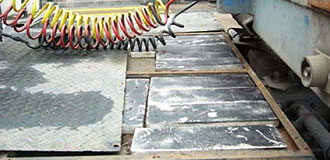 |
| 17
silver slabs weighing 255 kilograms were concealed
inside the frame rail behind the driving cab
of the tractor at Man Kam To Control Point |
|
|
On 20 July 2006, officers of Lok Ma Chau Control Point detected
a smuggling case in which 42 pieces of silver slab weighing 630
kilograms were seized from a container truck departing for the
Mainland. The seizures, valued at $2.24 million, were concealed
inside the inner parts of three trailer axles of the container
truck.
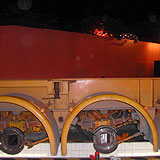 |
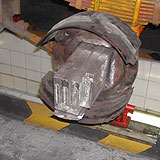 |
| 42
silver slabs weighing 630 kilograms were concealed
inside the inner parts of the three trailer axles
of the container truck at Lok Ma Chau Control
Point. |
Close-up
of the concealment at one of the three trailer
axles of the container truck |
|
|
|
|
| |
|
|
| |
|
|
| |
Arms
and Weapons
To prevent any smuggling of arms and weapons into Hong Kong, Customs
officers always maintain vigilance at all entry and exit points.
In 2005, Customs officers arrested 6 incoming travellers and 3
cross-boundary driver for illegal possession of firearms and weapons
at various land boundary control points. In these cases, 4 stun
guns, 3 knuckledusters, 1 imitation handgun, 1 baton and 1 oleoresin
capsicum foam were seized. Customs officers also arrested 6 incoming
travellers in 2006 and seized 4 pistols with magazines, 2 batons,
1 stun gun, 1 knuckleduster, 1 nunchaku, 1 sword and 1 pepper spray.
At the Hong Kong International Airport, seizures included pistols,
crossbows, various kinds of baton, assorted knives, Oleoresin Capsicum
foam, stun guns, archery products, bullets, etc. In 2005, there
were 19 cases detected with the arrest of 8 persons and total seizure
value was $105 937 In 2006, 25 cases were detected and 17
persons were arrested. Total seizure value amounted to $48 138.
|
|
| |
|
|
| |
|
|
| |
Establishment
of Explosive Detector Dog Teams
Throughout the years, operations of the two dog teams were carried
out effectively and efficiently. The two dog teams mainly worked
at the Kwai Chung Container Cargo Terminal but they would also
be deployed for working at various control points. In 2006, dog
handlers attended related courses organized by the Police to improve
their knowledge in the area of handling explosives.
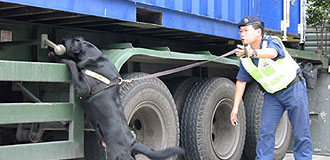 |
| Customs
officer is conducting check with the help of
explosive detector dog “Norton” |
|
|
|
|
| |
|
|
| |
|
|
| |
Counterfeit
and Pirated Articles
The department continues to accord high priority to the protection
of intellectual property rights, and Customs officers at various
entry and exit points always guard against the smuggling of counterfeit
and pirated goods.
A total of 57 cases with seizures valued at $29.2 million were
effected at various land boundary control points in 2005 under
the Trade Descriptions Ordinance. The seizures included
garments, handbags, shoes, mobile phones and accessories, leather
products, watches, computer accessories, cosmetics and household
goods bearing forged trade marks or false origin labels. In 2006,
31 cases under the same Ordinance with similar seizures valued
at $9 million were effected at various land boundary control points.
On 18 August 2005, officers of Lok Ma Chau Control Point seized
from an incoming private car 300 computer hard disks bearing forged
trademarks and false trade descriptions. The seizures, including
3 207 mobile phones and 2 800 pieces of Random Access
Memory (RAM), were worth $2.88 million.
At the Hong Kong International Airport, 53 cases were effected
with 10 persons arrested in 2005, and 77 cases were effected in
2006 with the arrest of 35 persons. Seizures such as infringing
DVDs, mobile phone accessories, computer parts and accessories,
clothes, handbags and watches fetched a total value of $8 million
and $13 million for 2005 and 2006 respectively.
On 17 January 2005, a total of 36 794 infringing game/mobile
phone accessories bearing forged trademarks of “Nokia”, “Motorola”, “LG” and “Nintendo” etc,
with an estimated value of $645 600, were seized from an export
consignment destined for Pakistan.
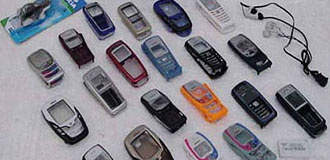 |
36
794 infringing game and mobile phone accessories
bearing forged
trademarks seized from an export consignment in
January 2005 |
|
|
On 25 October 2005, a total of 400 forged credit cards bearing
the “VISA” and “Master Card” logo were
seized from three outbound speedposts destined for London. Seven
Mainlanders were arrested as a result of subsequent control delivery
in London.
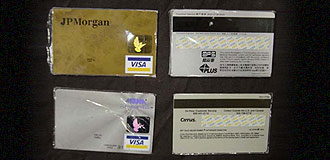 |
| A
total of 400 forged credit cards were found in
three outbound speedposts in July 2005. |
|
|
On 20 July 2006, a total of 16 500 infringing game cartridges
bearing forged trademarks of “Nintendo” and “Gameboy”,
with an estimated value of $1.65 million, were seized from an export
consignment destined for Dubai, United Arab Emirates.
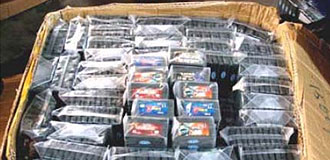 |
| 16
500 infringing game cartridges found inside an
export consignment by officers at the Airport. |
|
|
|
|
| |
|
|
| |
|
|
| |
Computer
Accessoriesies
Smuggling of high-value computer accessories to the Mainland was
prevalent in 2005. There were 39 such cases with seizure value
of $9.28 million in 2005. The figures for 2006 were 17 cases with
seizure value of $8.71 million.
On 21 September 2006, officers of Sha Tau Kok Control Point detected
a computer part smuggling case in which 1 200 pieces of Random
Access Memory (RAM) stick and 600 nos. of central processing unit
(CPU) were seized from a lorry departing for the Mainland. The
seizures, valued at $602 000, were found concealed inside a coffin
carried by the vehicle.
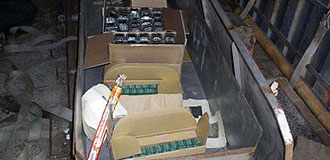 |
| Computer
accessories concealed inside a coffin leaned
at the inner part of the lorry at Sha Tau Kok
Control Point. |
|
|
|
|
| |
|
|
| |
|
|
| |
Telecommunication
Equipment
Smuggling of mobile phones to the Mainland continued. In 2005,
officers of the Control Points Command detected 32 such cases and
seized 8 040 sets of mobile phone and 118 353 pieces of accessories
valued at about $8.03 million. In 2006, 17 mobile phone smuggling
cases were detected, with seizure of 2 092 sets of mobile phones
and 33 570 pieces of accessories valued at about $1.86 million.
On 11 March 2005, officers of the Sha Tau Kok Division detected
a mobile phone smuggling case with seizure valued at $1.66 million.
A total of 758 sets of mobile phone were seized from an outgoing
private car. The seizures were concealed inside the side-skirt
and the compartment of the safety air bag of the vehicle.
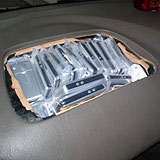 |
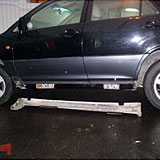 |
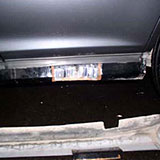 |
| Officers
of Sha Tau Kok Control Point detected a mobile
phone smuggling case with 758 sets of mobile phones
valuing $1.66 million. The seizures were concealed
inside the compartment of the safety air bag and
the side-skirt of the vehicle. |
|
|
|
|
| |
|
|
| |
|
|
| |
Vehicle
and Vehicle Parts
Smuggling of vehicles and vehicle parts remained rampant in 2005
and 2006. There were 65 smuggling cases with $5.09 million worth
vehicles and vehicle parts seized at the entry and exit points
in 2005. For the year 2006, seizure value amounted to $4.55 million
with 40 cases detected.
On 17 March 2006, the department intercepted a Mainland cargo
vessel in the waters off West Lamma Channel for clearance and officers
found 52 unmanifested dismantled vehicles on board the vessel.
The value of seizures amounted to $1 million. The captain of the
vessel was charged with “attempting to export unmanifested
cargo” and “failing to comply with the direction given
by a member of C&E Service” under the Import and
Export Ordinance and was sentenced to two months’ imprisonment.
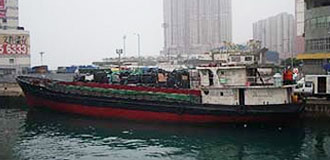 |
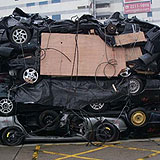 |
52
dismantled vehicles were found on board a Mainland
cargo vessel on 17 March 2006 |
|
|
In 2005 and 2006, Customs officers at the land boundary control
points detected 30 cases and 8 cases respectively involving vehicles
and vehicle parts. On 21 June 2006, officers of Lok Ma Chau Control
Point detected a smuggling case in which 6 dismantled left-hand-drive
private cars, valued at $800 000, were seized from a container
truck departing for the Mainland.
 |
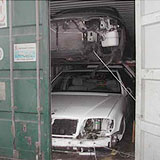 |
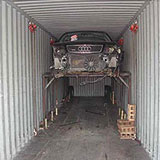 |
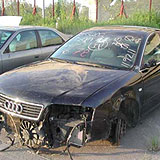 |
| Officers
of Lok Ma Chau Control Point seized 6 dismantled
private cars from a 40-foot container truck. |
|
|
|
|
| |
|
|
| |
|
|
| |
Optical
Disc Mastering and Replication Machine
On 22 June 2005, officers of Lok Ma Chau Control Point detected
a smuggling case in which 5 units of optical disc mastering and
replication machine were seized from a container truck departing
for the Mainland. The seizures, valued at $1.16 million, were camouflaged
by some plastic drums containing sand inside the container.
|
|
| |
|
|
| |
|
|
| |
Meat
and Poultry
Owing to the differential market price between Hong Kong and the
Mainland, smuggling of meat and poultry into Hong Kong in large
consignments conveyed by cross-boundary vehicles remained active
in 2005 and 2006. Besides, the sneaking in of small quantity of
fresh meat by local residents during their return from the Mainland
for re-sale or self-consumption was not uncommon.
Smuggling of meat into Hong Kong through the land boundary was
detected. To safeguard public health, apart from strengthening
intelligence collection, customs officers also conducted a series
of joint operations with the Food and Environmental Hygiene Department
(FEHD) at the land boundary control points.
On 27 March 2006, in a joint operation with the FEHD, officers
of Man Kam To Control Point seized from an incoming medium goods
vehicle 2 450 kilograms of unmanifested game, poultry, seafood,
vegetables and chilled pork and beef together with 5 200 sticks
of dutiable cigarette. The value of the seizures was about $75
000.
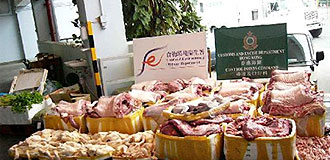 |
| A
total of 2 450 kilograms of chilled pork and
beef, game, poultry, seafood and vegetables,
and 5 200 sticks of cigarettes were seized in
a joint operation between the department and
the FEHD at Man Kam To Control Point. |
|
|
|
|
| |
|
|
| |
|
|
| |
Endangered
Species
In 2005 and 2006, Customs officers at the land boundary control
points detected 148 cases and 85 cases respectively of endangered
species of plants, birds and animals. The items involved American
ginseng, crocodile meat, cobra, bear bile powder, stony coral and
orchid etc.
On 10 December 2005, officers of Man Kam To Control Point searched
an outgoing 40-foot container truck which was declared as “empty”.
As a result, 26 drums of American ginseng weighing 1 179.36 kilograms
were seized from the container. The seizures, valued at $10 million,
were concealed inside a secret compartment located at the innermost
part of the container.
In January 2006, three cases of smuggling of pangolin were effected
through ports and maritime enforcement. These cases involved a
total seizure of 14 514 kilograms of pangolin carcass and 1 866
kilograms of pangolin scale which were classified as the endangered
species. All three consignments were falsely declared as “frozen
fish”. The containers were either imported from Malaysia
or Indonesia and were intended for re-export to the Mainland or
Taiwan. For the case effected on 7 January 2006, 1 224 kilograms
of chicken paws without a valid import licence by the FEHD were
also seized. The total value of seizures amounted to $3.47 million
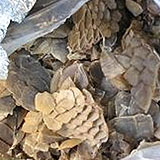 |
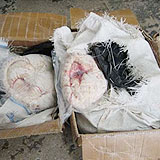 |
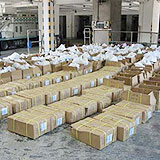 |
| 14 514
kilograms of pangolin carcass, 1 866 kilograms
of pangolin scale and 1 224 kilograms of chicken
paws were seized by officers of the Ports and Maritime
Command in January 2006. |
|
|
On 9 May 2006, a huge shipment of four tonnes of elephant tusks
concealed inside a 40-foot container arriving from Douala, Cameroon
was seized. It was the biggest haul made by the department since
the ban on international ivory trade in 1989. A total of 605 elephant
tusks were found hidden inside a false compartment at the innermost
part of the container. The value of the seizures amounted to $8
million. Investigation unveiled that the container was intended
for re-export to Macau. Two Hong Kong residents were subsequently
arrested in connection with the case.
At the Hong Kong International Airport, 64 cases involving the
importation of endangered species without licence were detected
with 55 persons arrested in 2005. Seizures included American ginseng,
crocodile specimen, crocodile meat, dried seahorse, pangolin meat,
orchids, ivory products and sea turtles shell, etc. which fetched
a total value of $402 224. In 2006, 48 cases involving the same
offence were also detected with 34 persons arrested at the Airport.
Seizures including American ginseng, crocodile specimen, crocodile
meat, orchids, ivory products, live land tortoises and dried seahorse
fetched a total value of $281 585.
On 4 July 2005, around 50.2 kilograms of dried sea horses, with
an estimated value of $20 080, were seized from an Indian male
arriving from Colombo, Sri Lanka .
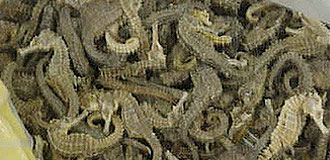 |
50.2
kilograms of dried sea horses were seized from
an incoming
passenger at the Airport in July 2005. |
|
|
On 14 February 2006, 5.6 kilograms of ivory product with an estimated
value of $16 800 were seized from an unclaimed baggage
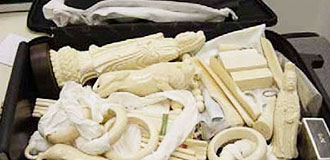 |
In
February 2006, officers at the Airport seized 5.6
kilograms of ivory
product from an unclaimed baggage. |
|
|
On 2 March 2006, 106 Indian star tortoises, with an estimated
value of $42 400, were seized from an import consignment arriving
from Kuala Lumpur, Malaysia.
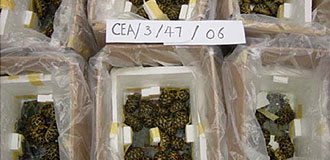 |
| Indian
Star tortoises seized from an import consignment
in March 2006 |
|
|
On 18 November 2006, 54 kilograms of ivory, with an estimated
value of over $30 000, were seized from a Gabonese male arriving
from Addis Ababa, Ethiopia via Bangkok.
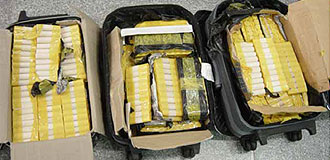 |
| 54
kilograms of ivory seized by officers of the Airport
Command. |
|
|
|
|
| |
|
|
| |
|
|
| |
Marked
Oil
The department launched the Voluntary Control Scheme on Sales
of Marked Oil for Marine Use (Voluntary Control Scheme) in May
2005 with the aims to suppress the seaborne smuggling of marked
oil into the Mainland and prevent marked oil from being re-landed
for use as illicit fuel. By means of registering the oil barges
delivering marked oil from the oil depots and analyzing their transaction
records, the department monitored the overall supply situations
of marked oil intended for marine use. A plunge of marked oil sales
had been observed since the implementation of the scheme and the
phenomenon was virtually the consequence of subsiding smuggling
activity.
Parallel to the Voluntary Control Scheme, the department had also
conducted special operations to detect and deter the seaborne smuggling
of marked oil to the Mainland. In the first quarter of 2006, the
department intercepted three fishing boats loaded with excessive
marked oil in their enlarged fuel tanks for the purpose of smuggling.
As a result, altogether more than 150 000 litres of marked oil
were seized and 10 offenders were arrested.
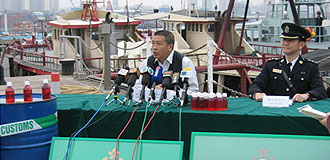 |
| Group Head of the Special Task Force
Albert Chan (left) held a press conference after
successfully netting over 100,000 litres of unmanifested
marked oil in an anti-smuggling operation on 7.11.2006.
On the right is the Divisional Commander (Marine
Enforcement) Carl Lam. |
|
|
|
|
| |
|
|
| |
|
|
| |
Fireworks
and Explosives
In 2005 and 2006, the department detected respectively 18 and
13 cases of smuggling of fireworks and explosives at various entry
and exit points.
It is worth-mentioning that on 8 January 2006, the department
intercepted a river trade vessel which arrived from Huangpu, the
Mainland for clearance. One container with content declared as “joss
paper” was selected for examination. As a result, officers
found 6 980 kilograms of assorted fireworks camouflaged with the
declared joss paper inside the container. The value of seizures
amounted to $1.41 million. Investigation unveiled that the consignment
was destined for Taiwan.
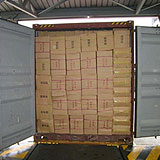 |
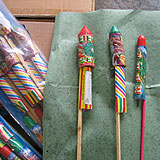 |
6
980 kilograms of assorted fireworks camouflaged
with joss
paper found inside a container on 8 January 2006. |
|
|
|
|
| |
|
|
| |
|
|
| |
Strategic
Commodities
On 2 April 2006, the department detained a shipment of aircraft
at the MTL Terminal. The shipment was conveyed by an ocean-going
vessel from Yiantian, the Mainland to Hong Kong. It was later confirmed
that the seizure was a non-civil aircraft, a strategic commodity
under the Import and Export (Strategic Commodities) Regulations.
The value of the seizure amounted to $5 million. Investigation
unveiled that the non-civil aircraft had been loaded in Ukraine
and would be transshipped to the United States.
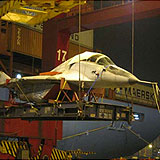 |
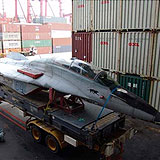 |
The
department detained a shipment of aircraft in
April 2006. |
|
|
|
|
| |
|
|
| |
|
|
| |
Anti-smuggling
Operation at Sea
In view of the diversified modus operandi in sea smuggling, the
department is keen on mounting various operations with a view to
detecting and deterring these illicit activities. Some major operations
against sea smuggling include:
(a) Operation “Ballkicker” – A
joint operation with Marine Police was organized to combat smuggling
activities at sea. Officers mounted observations at black spots
with the assistance of high speed pursuit craft (HSPC). Once suspicious
vessels were detected, HSPCs would be summonsed for interception.
(b) Operation “Kitecutter” – In
view of the public concerns about freshwater fish consignments
imported from the Mainland which might contain malachite green
and other harmful substances, a joint operation was mounted by
officers of Food and Environmental Hygiene Department (FEHD), Agriculture,
Fisheries and Conservation Department, Hong Kong Police Force and
this department to inspect Mainland freshwater fish in April 2006.
During the operation, vessels discharging live or frozen freshwater
fish were attended by customs officers to ensure that the fish
consignments were covered by import manifests; and by officers
of FEHD to ensure that the consignments were accompanied with health
certificates.
(c) “Boat-to-Boat” Operation – Special
operations were mounted by officers of Government Flying Service
(GFS), Guangdong Customs and this department to combat smuggling
activities by "Chung Fei" at sea. Whenever suspected "Chung
Fei" were spotted by officers of GFS, they would be referred
to this department and Guangdong Customs for actions. During an
operation in April 2006, the department seized a batch of optical
discs at Mirs Bay in the waters of Hong Kong.
|
|
| |
|
|
|

